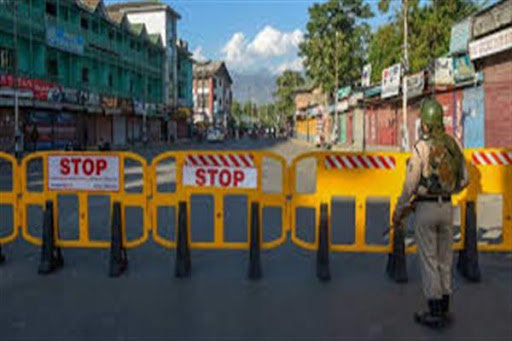A government official Tuesday blamed people for the “system failure” during the recent floods in Kashmir, inviting severe condemnation and flak.
Speaking in the backdrop of government’s response to the disaster that hit Kashmir in September, Dr Syed Abid Rashid, Sub-District Magistrate Srinagar (East), said the State operates in certain systems and those systems are allowed to be operated by the people. “But people were so badly impacted by the floods that the system collapsed,” he said, speaking at a daylong seminar at the University of Kashmir.
Abid, who is presently coordinating relief and rehabilitation endeavors by NGOs, said “this disaster was waiting to happen given the havoc we have wreaked with urbanization. The State operates on the basis of a community. The State can do as much as it can. But when people don’t have the collective conscience, the State can do little,” he said, adding, “The community response as a whole has been knee-jerk and very bad. Having said this, the rescue operation by volunteers ‘here and there, left right and center’ has been phenomenal,” he said.
Abid said it was “the situation of abject anarchy where the State did what it could.” “Jhelum was flowing three times more than its carrying capacity (at 1.30 lakh cusecs),” he said.
He said the government has roped in 40 to 50 NGOs to establish pre-fabricated huts for the flood affected people. “Today there are systems in place vis-à-vis relief and rehabilitation. We have learnt our lessons and all of us, as a community, need to prevent recurrence of such disasters,” he said.
Abid’s remarks ran contrary to the Chief Minister’s assertions on people’s response to floods. “If police, Army, CRPF and BSF saved lakhs of people, then if I say that the youth of Srinagar saved lakhs too, it won’t be wrong. We perhaps do not know your names and would not ever, but we salute your efforts and hard work. I take the opportunity to thank you on behalf of the people you saved and on my and my government’s behalf,” Omar said on October 22. The Government even announced bravery awards for volunteers who rescued people during the deluge.
Abid drew sharp flak for his comments. “Such a response is complete provocation. It is a repetition of the State’s response to the floods which is very sluggish and miserable. The question is why the Government was caught napping?” asked senior journalist, Masood Hussain.
Hussain said the flood crisis was “party manageable” as was done in old Srinagar “if the government had rendered its assistance to people.” “It took three days for the SDRF men to launch the rescue operation. The concertina wire laid by forces punctured their boats and they blamed people for blasting their boats,” he said.
He said the keys of relief material dumped at Pampore are lying with a truck driver who comes on the directions of his bosses to open the store. “Such is the state of affairs,” he said.
He said a senior lawmaker “diverted” a relief truck while a senior government functionary “diverted another truck carrying 3500 induction cookers.”
The seminar titled “Kashmir floods: Genesis, Responses and Way Forward” was organized by the Center for Research and Development Policy (CRDP) in collaboration with NGO, ActionAid India.
Speaking on the occasion, civil society activist Shakeel Qalandar demanded a probe into the causes of floods and “negligence” on part of the government. He demanded flow of international aid to the Valley to rebuild the devastated infrastructure.
He said an immediate issue “that stares in our face is the degree of unemployment that the flood devastation has shot up and this needs to be addressed on priority.”
Noted psychiatrist Dr Arshad Hussain said people of Kashmir have braved the flood ‘trauma’ with resilience and resistance. “We are culturally coping with disasters with resilience and that’s the reason we saw very less number of trauma cases post-floods,” he said.
He said “we saw 13 patients with flood trauma. But these were basically the cases who had lost their homes due to the deluge. And this also testifies a fact that we are culturally very closely associated with our homes.”
Chief Town Planner, Iftikhar Hakeem, called for immediate end to “unsustainable urbanization, constructions along riverbeds”, and also a policy framework in place for flood control.
Action Aid (India) Project Manager for J&K Office, Tanveer Ahmad Dar said the state government needs to adopt long-term and sustainable solutions like passing the food security legislation. He said the present ration distribution for the flood affected should be increased and the affected families should be given “food baskets” which include rice, pulses, oil, spices and other items.
“The quantity should be increased to minimum of 83 kgs for a family of six members,” Dar said. He said the assessment done by Revenue Department vis-à-vis damages should be displayed publicly before compensating people so that the grievances, if any, are redressed.
Action Aid India is working in 60 flood affected villages across Kashmir for relief and is working in about 100 villages on mental health issues.
CRDP chairman Suhail Masoodi said the aim of the seminar was to critically assess the causes of floods, its multifarious implications and the response to the disaster from governmental and non-governmental agencies. “The challenges which may occur due to floods like rise in unemployment, loss of livelihoods and rise in urban and rural poverty are some important questions we need to address,” he said.
Others who spoke on the occasion included Dr Saleem-ur-Rehman, Director Health; Shafaat N Ahmad, Development Practitioner; Shujaat Bukhari, Senior Journalist; Deepali Sharma, Director Organizational Effectiveness ActionAid India; Prof MA Wani, Dean Academic Affairs University of Kashmir and Dr GM Dar (Associate Professor, IMPA).


